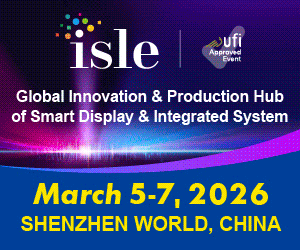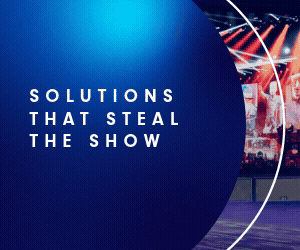Ayrton fixtures feature in Tim Routledge’s Eurovision dream
- juliana6232

- Aug 31, 2023
- 3 min read

In a unique collaboration, the 67th Eurovision Song Contest, that annual extravaganza of music and lighting, was hosted in Liverpool by the UK, on behalf of last year’s winners, Ukraine ‐ the first time two countries have co‐hosted the event. Two semi‐finals on 8th and 11th May saw 37acts whittled down to 26 finalists for the spectacular Grand Final on 13th May at the Liverpool M&S Bank Arena. The show reached record UK viewing figures and was broadcast globally to over 160 million viewers.
In what he calls ‘a dream‐come‐true project’, multi award‐winning lighting designer, Tim Routledge and his team were, in addition to all 37 performances, responsible for every aspect of the lighting including presentation states, commentator boxes, voting sequences, and the half‐ time and opening shows for the two semi‐finals and Grand Final. This massive undertaking was based on briefings, renders and notes ‐ mostly delivered remotely ‐ and a 20‐minute meeting with each of the countries’ delegations in March. “We had to focus on the key points from each to realise their design wishes, and work fast to deliver everything within the time frame,” says Routledge.
With such tight time schedules and high‐profile exposure, Routledge needed equipment that was fast, accurate, versatile and reliable. He chose Ayrton’s new Zonda 9 FX, Karif LT, MagicBlade R and the laser‐sourced Cobra as key components of his lighting inventory.
90 Zonda 9 FX were used to create 10 ‘Svoboda 3000’ pods, Routledge’s modernised recreation of the classic Svoboda batten, which he says were a ‘massively important feature’ in the show. The pods were mounted on independent automated hoists, and tessellated within the three concentric rings of oval lightboxes above the centre stage to form one big curve, and could each be lowered and raised at will.

“I’ve always loved those Svoboda lights, plus it was a kind of nod to my late father who first gave me a book on Josef Svoboda when I was young,” says Routledge. “We wanted to create a Svoboda pod that was epic and could fly in and out individually.”
Zonda 9 FX’s large face was ideal for providing the eye candy and dressing looks that Routledge was after, as well performing as a punchy wash light.
“Zonda 9 FX has great power, but we chose it mainly for the clever matrix effect (LiquidEffects™) on the front,” he says. “These gave really cool looks to fill the shots when they were dropped in low, and also had the ability to create something pretty without having to blow the shot with loads of powerful light ‐ they looked great without even having to use their punch. They proved very popular with the delegations and fulfilled the brief of what I was trying to do with the pods perfectly.”
96 MagicBlade R were rigged in the central chandelier feature that filled the space between the oval light boxes in the centre of the arena. These were used for “fun stuff and sky eye candy filling the centre spot above the oval stage.”

50 laser‐sourced Cobra, which can narrow down to the tightest of beams at 0.6°, were rigged down the sides of the arena to provide big beam looks for all the audience ‘down‐the‐room’ shots and dressing shots for camera reverses.
“The Cobras were used really well on several numbers, especially France’s prop which was edged in a mirror ball fascia, and during the Semi‐Final 1 half‐ time show when the performers opened up their costumes to reveal a mirrorball textured heart jacket,” says Routledge. “We pointed the Cobras at those with phenomenal effect.“
At another point, Spain wanted their artiste to scoop up a beam of light in her hand – one Cobra was aimed at a specific spot for a closeup on her hand bathed in high intensity light that looked she was literally holding light. The punch and the tight beams the Cobras gave us shooting from 80m – well they were brilliant in every sense of the word!”
30 Karif LT were rigged around the arena on goal posts to provide back beams for the audience shots and add background texture to the oval stage’s left and right wings. “To avoid compromising audience sightlines we were quite restricted for space and height, so I needed a compact beam light that would work well in those tight spaces. Finding the right LED fixture that was small and fast was the challenge, and Karif LT fitted the bill really well.”

“I want to heap praise on my programmers Tom Young, Alex Mildenhall and Mark Nicholson who programmed over 79,000 beat‐perfect precise lighting cues, and my associate LD, James Scott, for helping this dream come to fruition,” concludes Routledge.
Neg Earth Lights was the official lighting supplier for Eurovision Song Contest 2023, with great technical support by Ambersphere.
Photos © Chloe Hashemi














Comments